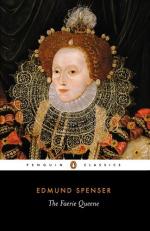The second day there came in a Palmer bearing an Infant with bloody hands, whose Parents he complained to have bene slaine by an enchauntresse called Acrasia: and therefore craved of the Faery Queene, to appoint him some knight to performe that adventure, which being assigned to Sir Guyon, he presently went foorth with the same Palmer: which is the beginning of the second booke and the whole subject thereof. The third day there came in a Groome, who complained before the Faery Queene, that a vile Enchaunter, called Busirane, had in hand a most faire Lady, called Amoretta, whom he kept in most grevious torment. Whereupon Sir Scudamour, the lover of that Lady, presently tooke on him that adventure. But beeing unable to performe it by reason of the hard Enchauntments, after long sorrow, in the end met with Britomartis, who succoured him, and reskewed his love.
But by occasion hereof, many other adventures are intermedled; but rather as accidents then intendments. As the love of Britomart, the overthrow of Marinell, the miserie of Florimell, the vertuousness of Belphoebe; and many the like.
Thus much, Sir, I have briefly-over-run to direct your understanding to the wel-head of the History, that from thence gathering the whole intention of the conceit, ye may as in a handfull gripe all the discourse, which otherwise may happely seem tedious and confused. So humbly craving the continuance of your honourable favour towards me, and th’ eternall establishment of your happines, I humbly take leave.
Yours most humbly affectionate,
EDM. SPENSER.
23 Januarie, 1589.
[1] The letter served as an introduction
to the first three books of the
Faerie Queene.
[2] An allusion to Sir Walter Raleigh’s poem Cynthia.
* * * * *
To the Right Noble and Valorous Knight,
SIR WALTER RALEIGH,
Lord Wardein of the Stanneryes, and Lieftenaunt of Cornewaile,
To thee that art the sommers Nightingale,
Thy soveraigne Goddesses most
deare delight,
Why doe I send this rustick
Madrigale,
That may thy tunefull eare
unseason quite?
Thou onely fit this argument to write
In whose high thoughts Pleasure
hath built her bowre,
And dainty Love learnd sweetly
to endite.
My rimes I know unsavory and
sowre,
To taste the streames, that, like a golden
showre,
Flow from thy fruitfull head,
of thy Loves praise;
Fitter perhaps to thunder
martiall stowre,
When so thee list thy loftie
Muse to raise:
Yet, till that thou thy poeme wilt make
knowne,
Let thy faire Cinthias praises be thus
rudely showne.
E.S.
* * * * *
TO
THE MOST HIGH, MIGHTIE, AND MAGNIFICENT
EMPERESSE
RENOWNED FOR PIETIE, VERTVE, AND ALL GRATIOVS GOVERNMENT




